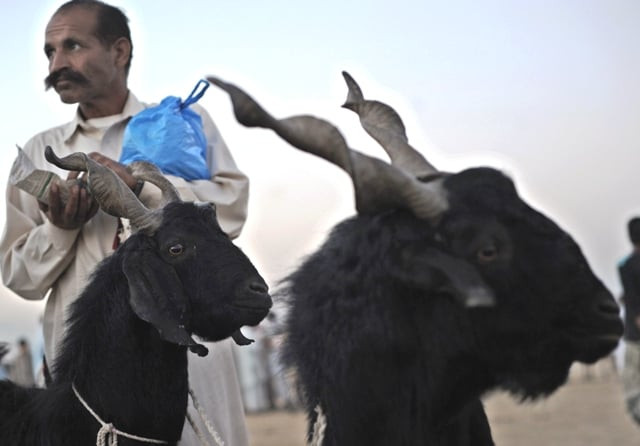Eid and happiness
For many years now, our Eids have been sad occasions overshadowed by events that deter us from expressing happiness.

There are certain economic laws that the media wants to defy when it depicts the negative side of the holy occasions of Hajj and Eid. Ever since the country’s creation, the price hike is portrayed as a shock that should be prevented. Yet, because of the entry of some young and knowledgeable journalists into these business programmes of TV channels, the hike is now described as helpful to farmers who raise sacrificial animals. The economy of sacrifice — from the rearing of the animal to its sale — is in complete conformity with the laws of economics; it is the common man who benefits on the production side and the charities who gain from the sacrificial spinoff of hides.
Media hype portraying the market negatively, however, cannot be ignored. Every Eid, there is a general rise of the price graph because of the spurt in demand when people feel like spending. Looked at closely, the chain of many sellers cannot be called profiteers. (In Ramazan, too, rising prices also benefit the makeshift handcart salesman who appears just for the duration of the month when even the poor consume a bit more than usual.) One can say that our Eids elevate the economy through heightened marginal consumption. But taking the camera to the market of sacrificial animals and making the buyer complain about how the ritual has gone out of his reach shows only half the picture of the economy of Eid.
There was ‘shock’ coverage of the goat that sold for a million rupees in Lahore. Why denigrate the occasion and portray Pakistanis as selfish and profiteering persons? If the market is thin on the supply side and demand is healthy why shouldn’t the livestock farmer make his extra buck? So what if a rich man has walked away with the prize goat, leaving the poor kibitzer standing by in despair? This time it is the not-so-rich livestock farmer who looks like he is ripping everyone off. Let it be said, however, that some media coverage also highlighted the risk the farmer took in travelling with his expensive animals through various official and unofficial bottlenecks on the road where he had to shell out ‘security’ money. The poor man, however, who brings in fodder for the animals has the post-flood market on his side.
Some awkwardness cannot be ignored no matter how optimistically you scan Eidul Azha. The railways issued salary cheques that bounced, as a result of which the railwaymen struck work which, in turn, left a number of Eid-related trains stranded. The economy is still on its way down and opinions differ sharply on how this downward slide can be stopped. Gloom results from the wrong portrayal of crises by our leaders and TV anchors telling people that defiance of the IMF conditionalities is the right way to go, and that any taxation enhancing the revenue of the state in these troubled times is an extortion.
If it is any consolation, the entire Islamic World has been described in the khutba of the chief cleric of the Kaaba as a polity in trouble of one sort or another. If you count Eid Milad also, our three Eids make us sad, which invariably concentrates our minds on where we have gone wrong. The chief cleric this year spoke less of the unfairness of the world against Muslims and more of the cruelty of Muslims against Muslims. Eid Milad has more often than not been marred by one major sect slaughtering the other. Let us hope that this Eid passes without violence.
Published in The Express Tribune, November 17th, 2010.














COMMENTS
Comments are moderated and generally will be posted if they are on-topic and not abusive.
For more information, please see our Comments FAQ